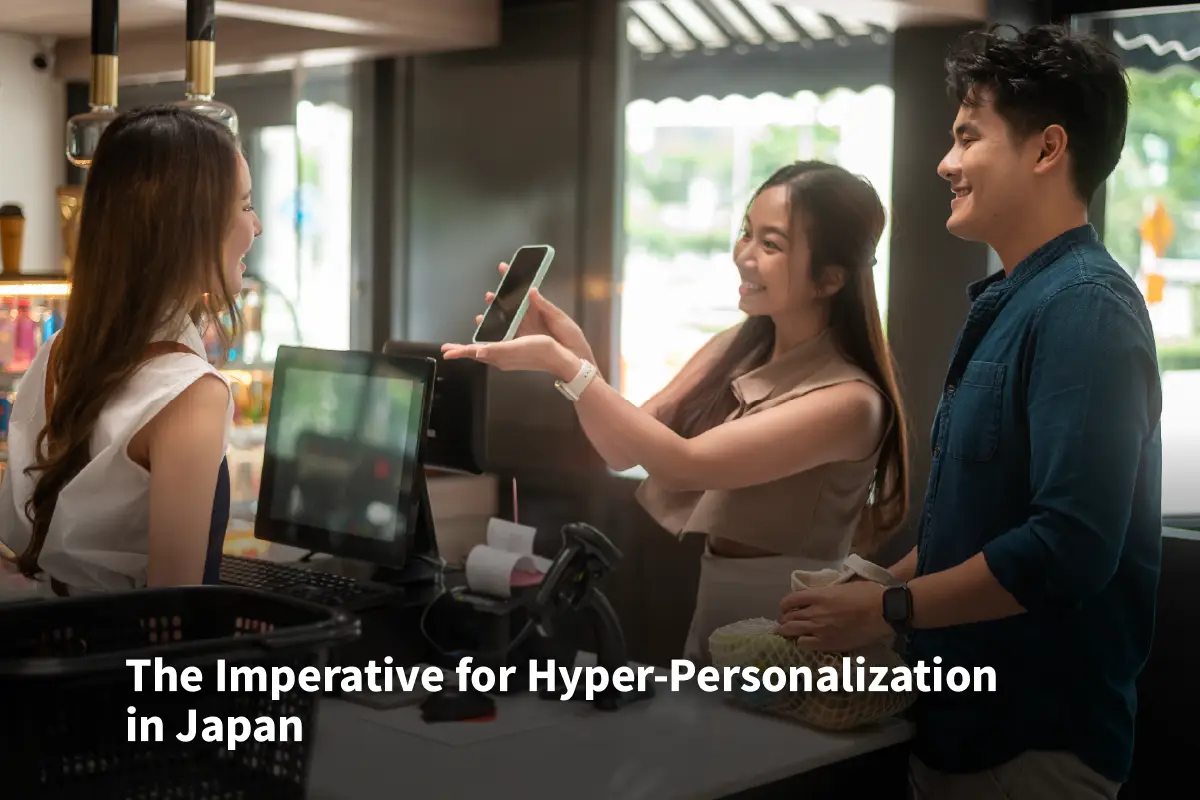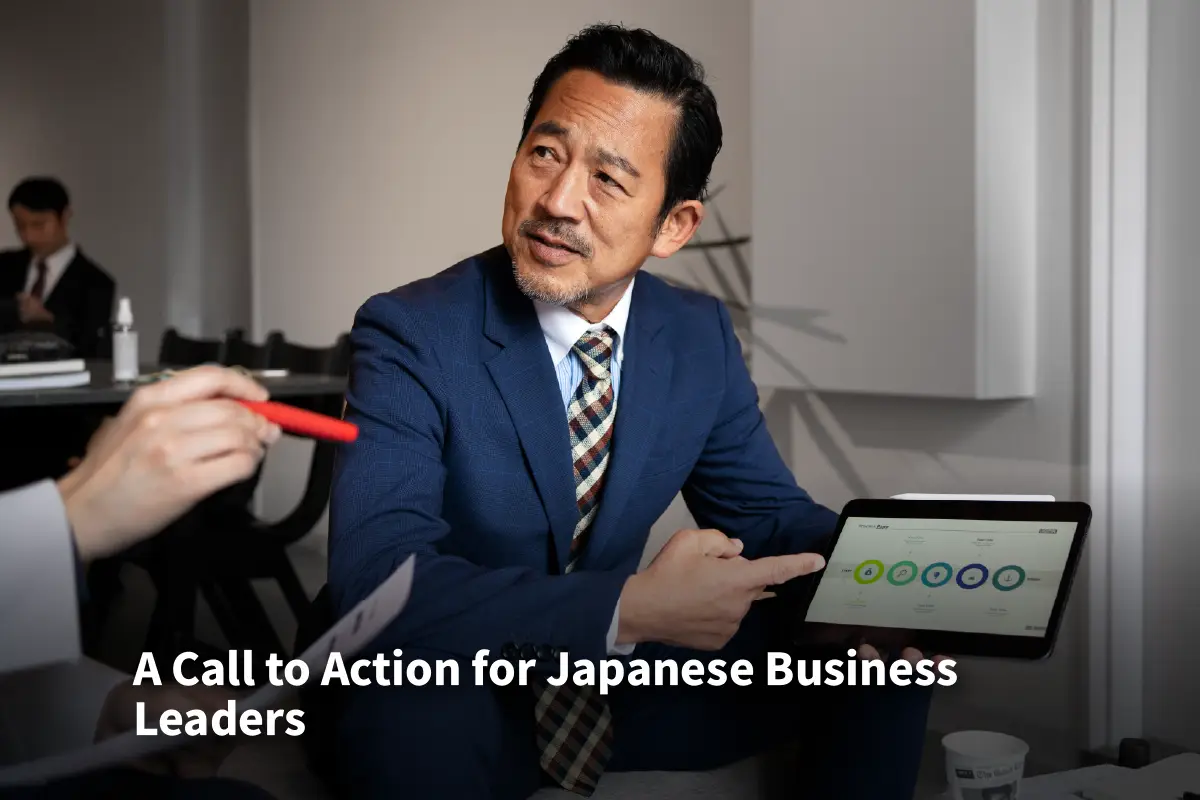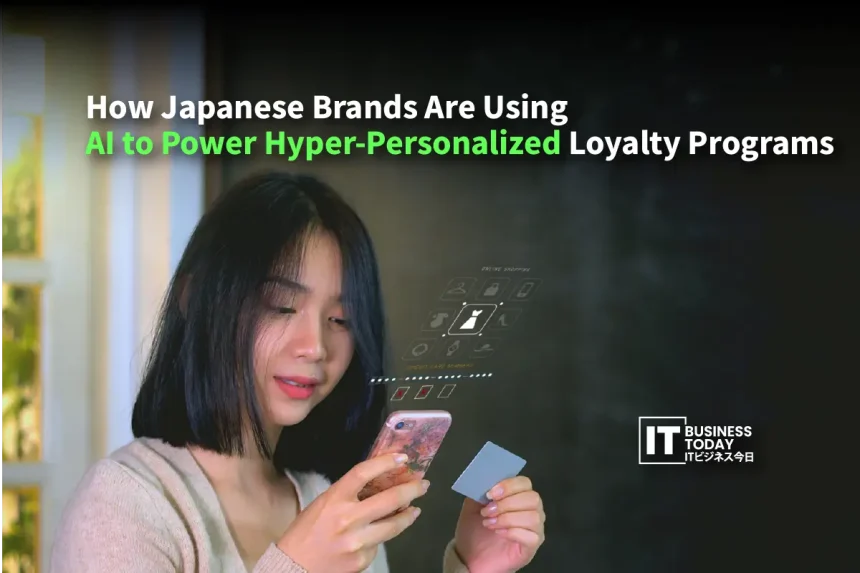何十年もの間、日本のカスタマー・ロイヤリティ・プログラムはおなじみのリズムで運営されてきました。スタンプを集め、ポイントを獲得し、予想通りの特典と交換。このシステムは一貫性と認知に重点を置いていました。このシステムは、ビジネス文化に根強い尊敬とギブ・アンド・テイクという重要な価値観を示していました。今日、多くの消費者は、一般的なオファーや短期間の割引の洪水に直面しています。この伝統的なモデルは、あまりにも取引的で、非人間的にさえ感じられます。日本のトップブランドの役員室では、静かな変化が起きています。彼らは人工知能を使ってロイヤリティ・プログラムを変えようとしているのです。彼らが目指しているのは、個人的で、予期的で、感情的な体験を創造することです。このような体験は、単純な取引を超えるものです。これは単なるアップグレードではありません。AIを活用したハイパー・パーソナライゼーションへのスマートなシフトです。この変化は、顧客との関わり方に関する新たなグローバル・スタンダードとなります。.
日本のカスタマー・ロイヤルティ市場は、年間15.4%の成長が見込まれ、その市場規模は以下の通りです。 US$ 38.7億ドル 2025年に
日本におけるハイパー・パーソナライゼーションの必要性

日本の消費者環境は、ユニークな課題と機会を提供しています。日本の消費者はサービスに対して非常に高い基準を持っています。無私のもてなしを意味する「おもてなし」は単なるトレンドではなく、消費者が期待するものなのです。同時に、消費者はよりデジタルに洗練され、価値に敏感になっています。従来のポイントシステムは頼りになります。しかし、個々の嗜好やニーズの変化を見落としてしまうことも少なくありません。迅速な対応ができないのです。隠れたニーズを見逃し、割引券以外の真の価値を提供する柔軟性に欠けています。
このギャップが 戦略的 必要不可欠なもの競争の激しい市場では、新規顧客を獲得するためには多くのコストがかかります。ですから、忠実な顧客を維持することが重要です。AIによるハイパー・パーソナライゼーションが鍵です。顧客の見方が変わります。顧客を大まかなグループに分けるのではなく、一人ひとりをユニークな存在としてとらえるのです。顧客にはそれぞれ好み、ライフステージ、ニーズがあります。日本のブランドは、細部にまで気を配り、顧客を重視することで知られています。このテクノロジーを鈍感な道具としてではなく、関係を強化するための洗練された道具として使うことができるのです。.
こちらもお読みください: デジタル・コワーカーズ人間とAIのコラボレーションを中心としたワークフローの設計
パーソナライゼーションの飛躍
では、日本の大手企業はどのようにAIを統合し、このハイパー・パーソナライゼーションを実現しているのでしょうか?それは、魔法のアルゴリズムだけではありません。スマートな能力を結集させることなのです:
- 規模に応じたデータ統合: AIは、膨大で断片的なデータセットを取り込み、理解することを得意としています。これには、購買履歴や人口統計などの構造化データが含まれます。また、非構造化データも含まれます。例えば、ソーシャルメディアのセンチメント、顧客サービスのチャット、アプリやサイトの閲覧習慣などです。天気や地域のイベントなどの文脈データも重要です。楽天やソフトバンクのような日本の大手企業は、さまざまなデータストリームを収集することに長けています。彼らは金融、通信、電子商取引、旅行など多くの分野で事業を展開しています。AIは大量のデータを選別します。AIは人間のアナリストや通常のデータベースクエリでは見えない微妙なパターンやつながりを発見します。
- 傾向予測モデリング: ここでAIはリアクティブからプロアクティブへと移行します。高度な機械学習モデルは、過去と現在のデータに注目します。顧客が次に何を買うか、また、いつ、なぜ、他に何を欲しがるか、必要とするかを予測します。ある百貨店チェーンは、AIを使って顧客がいつ高級スキンケアを購入するかを推測することができます。高級旅行への関心を閲覧データからチェックすることもできます。特別なスキンケア旅行キットを提供することもできます。顧客は提携航空会社のボーナスポイントも得られます。それは、顧客が明確にする前にニーズを予測することであり、デジタルを具現化することです。 おもてなし.
- 動的オファー生成と最適化: 静的な特典カタログは遺物になりつつあります。AIは、パーソナライズされたオファーやエクスペリエンスのリアルタイム生成と最適化を可能にします。システムは予測モデルを使用して最適なリワードやインセンティブを選択します。システムは現在のコンテキストに注目します。これには、場所、時間帯、カートの中身、最近のインタラクションなどが含まれます。これは、人気商品の特別早期アクセスチャンスかもしれません。また、最近購入した商品に関連した無料サービス、例えばオンラインで腕時計を購入した後に刻印を無料で入れることもできます。よく購入する商品の特別割引を受けられるかもしれません。また、優先的なカスタマーサポートのような特典を享受できるかもしれません。AIはテストと学習を続けています。さまざまな顧客プロフィールにアピールするオファーを見つけ出します。そして、常にアプローチを改良していきます。世界的に見て、AIを活用したロイヤルティプログラムは最大で次のような成果を上げています。 25顧客エンゲージメントが%増加し、顧客満足度が20%増加。
- センチメント分析と感情共鳴: 日本人のコミュニケーションは、微妙なニュアンスや暗黙の了解が重視されます。AIツールは、カスタマーレビュー、コールセンターのログ、ソーシャルメディア上のチャットの感情を分析するのに役立ちます。これらのツールは、日本語のニュアンスを理解することに優れています。例えば、敬語を扱うことができます。これにより、ブランドは満足度だけでなく、感情、不満、喜びの瞬間を測定することができます。ロイヤリティ・プログラムは、有益な方法で対応することができます。不満を感じている顧客に対して、個別のサポートを提供するかもしれません。あるいは、喜んでいる顧客にささやかなプレゼントを贈ることもできます。これにより、単なる販売にとどまらない、真の感情的なつながりが構築されます。
- パーソナライズされたコミュニケーション・ジャーニー: AIが高度にカスタマイズされたコミュニケーションのオーケストレーションを推進します。AIは、各会員への最適な連絡方法を見つけます。電子メール、アプリ通知、SMS、ダイレクトメールなど、適切なチャネルを選択します。そして、いつ、どれくらいの頻度で、どのようなメッセージを送るかを決定します。ある顧客にはアプリでソフトリマインダーを送るかもしれません。また、ネットで気に入った商品の職人技についての記事をメールで送ることもできます。このメールは顧客の好きな時間に届きます。
成功を照らす
理論は説得力がありますが、その証明は実行にあります。日本の象徴的なブランドはその先頭に立っています:
- トヨタ / レクサス:ロイヤリティ・プラットフォームは AI サービス・リマインダーにとどまりません。運転パターンや走行距離など、車両テレマティクスのデータを分析します。ハイブリッド車やEVのバッテリーの状態をチェックします。サービス履歴やオーナーの好みも確認。AIはサービスに最適な時期を予測します。また、ライフスタイルに合ったアクセサリーを推奨します。これはあなたの運転習慣や移動場所に基づいています。さらに、カスタマイズされた保険プランや特別なドライビング体験も提供します。レクサスのオーナーにとっては、「提携する高級ホテルで特別な週末の旅をお楽しみください」という親切なメモとして表示されるかもしれません。無料のバレーサービスやEV充電もあり、絶景ドライブに最適です。クルマの所有が継続的で楽しい体験に変わります。.
- ユニクロ/ファーストリテイリング:ユニクロは世界的に大規模な展開をしており、必要不可欠な衣料品に焦点を当てています。パーソナライズされた商品の補充や検索にAIを活用。AIは購入履歴、アプリの閲覧習慣、天候データを調べます。これにより、ヒートテックやエアリズムのような主要アイテムの再入荷が必要になる時期を予測。これにより、パーソナライズされたリマインダーやオファーがトリガーされます。同時に、顧客のスタイルや過去に購入した商品にマッチする新しいアイテムやカラーを表示します。これは、基本的な「こんな商品もいかがですか?あなたのワードローブに合ったアイテム」を提供します。このように、便利さと発見がミックスされることで、より適切な毎日が送れるのです。.
- 楽天:Eコマース、フィンテック、テレコム、旅行など広大なエコシステムを持つ楽天は、豊富なデータを有しています。そのAIエンジンである楽天AIは、スーパーポイント・ロイヤリティ・プログラムを支える強力な存在です。単にポイントを提供するだけでなく、超パーソナライズされた価値あるエコシステムを構築します。AIはいくつかの方法で会員に報酬を与えることができます。例えば、楽天銀行を使って支払いをすると、ボーナスポイントが付与されます。また、楽天トラベルの割引パッケージを提案することもできます。これは、会員が最近閲覧した場所に基づいています。AIは、Eコマース商品の特価情報を提示するかもしれません。この取引は会員の注意を引く可能性が高いです。これらのオファーはすべて、会員が必要なときに必要な価値を高めるように調整されています。これはデジタル時代の系列モデルを活用したものです。実際 楽天 ホーム&ガーデンカテゴリーのクライアントでは、AIを活用したプログラマティック・ロイヤリティを利用することで、買い物客が107%増加、来店者数が81%増加、注文金額が5%増加しました。
- 日本航空(JAL): 競争の激しい航空業界では、ロイヤルティが最も重要です。JALは、JALマイレージバンク会員の旅程全体をパーソナライズするためにAIを使用しています。これには、過去のフライトからお好みの座席やお食事の選択肢を推測することも含まれます。また、アップグレードオプションも提供します。価格は旅行者が何を重視するかによって変わります。また、関連する体験や提携先のオファーも提案します。これらのオプションには、お客様の旅行履歴や興味に合った文化ツアーやお食事オプションが含まれます。目標は、それぞれの交流が特別なものに感じられるようにすることです。私たちは、日本のおもてなしをロイヤリティのデジタルの世界に持ち込みたいと考えています。
課題と戦略的課題
AIを活用したハイパー・パーソナライゼーションの導入は、特に日本独自の状況において、ハードルがないわけではありません:
- データのプライバシーと信頼(重要な懸念事項):日本の消費者と規制当局はデータプライバシーを非常に重視しています。ブランドはデータをどのように収集し、どのように使用するかを明確にしなければなりません。APPI(個人情報の保護に関する法律)のようなルールに従う必要があります。信頼の構築は譲れません。これは、明確なオプトイン・オプション、強固なセキュリティ、真の価値交換を意味します。例えば、『お客様のデータは、お客様により良いサービスを提供するためにのみ使用します。また、フェデレーテッド・ラーニングやディファレンシャル・プライバシーなどのプライバシー強化技術(PETs)を使用することもあります。信頼は、ハイパー・パーソナライゼーションが構築される基盤です。.
- 統合の複雑さ: 日本の大企業ではレガシーシステムが一般的です。AIをCRM、POS、eコマース、データウェアハウスシステムと統合するには、慎重な計画が必要です。また、大きな技術投資も必要です。特定の顧客セグメントやユースケースから始める段階的アプローチは、しばしば賢明です。
- 割引を超えた「価値」の定義:ハイパーパーソナライゼーションの管理が不十分だと、頻繁なディスカウントを引き起こす可能性があります。適切な価値を提供することに集中しましょう。これには、独占性、利便性、認知度、ユニークな体験、時間の節約、パーソナライズされたサービスなどが含まれます。日本ブランドは、その豊かな品質と革新の歴史をアピールすることで、際立つことができます。製品のマスタークラスへの特別招待や特別なコラボレーションへの早期アクセスは、単純な割引よりも価値があることが多いのです。
- 人間とAIのバランス: テクノロジーは人とのつながりを代替するのではなく、強化すべき。AIはチャンスを発見し、パーソナライゼーションを強化します。それでも、ブランドの心と価値観は輝きを放たなければなりません。AIが現場のスタッフに洞察を与えることで、店舗や顧客に対してパーソナライズされたサービスを提供することができます。目標はスムーズな統合です。AIがデータ分析を行うことで、スタッフは共感と強固な関係構築に集中することができます。.
- 文化的ニュアンスとアルゴリズム・バイアス:AIモデルには綿密な監視が必要です。これは文化的無神経や意図しないバイアスを防ぐのに役立ちます。アルゴリズムが日本人のコミュニケーションスタイル、価値観、社会規範を尊重するようにすることは非常に重要です。厳密なテストと多様な開発チームが不可欠です。
ハイパー・パーソナライゼーションの行方
日本におけるAIを活用したロイヤルティは、より統合的で洗練されたものになりつつあります。
- ロイヤリティ・エコシステムの台頭:競合しないブランド間のチームワークがさらに進むでしょう。これには自動車、旅行、高級品、ホスピタリティなどの分野が含まれます。彼らが目指すのは、一体感のあるAI主導のロイヤルティ体験です。一流クレジットカード、高級ホテルチェーン、高級店が、ユーザーの同意がある場合に限り、インサイトを共有することを想像してみてください。彼らは、スムーズでパーソナライズされたラグジュアリーライフスタイルプログラムを構築したいと考えています。このプログラムは、あらゆる分野のニーズに応えます。伝統的なケイレツ・モデルは、データ・パートナーシップの中で新たな表現を見出しています。.
- 予測サービスとプロアクティブケア:AIは購買予測にとどまりません。サービスのニーズを予測し、潜在的な不満を発見します。ロイヤリティ・プログラムでは、問題が発生する前に支援や解決策、好意のジェスチャーを提供します。これは顧客の幸福に対する強いコミットメントを示すものです。製品の予知保全と積極的なカスタマーケア活動を組み合わせることをお考えください。.
- リアルタイム・コンテクスト・リワード:位置情報技術、IoT、高速分析が、現在のイベントに基づいて報酬を引き出します。提携店舗の前を通ったら?パーソナライズされたオファーを即座に受け取ることができます。接続されたデバイスによって追跡されたフィットネス目標を達成したばかりですか?ポイントや健康に関連した報酬を獲得できます。このプログラムは、アンビエントで応答性の高いコンパニオンとなります。
- 製品/サービス体験におけるロイヤルティ:パーソナライゼーションは、ロイヤリティ・アプリだけでなく、製品やサービスにも導入されるでしょう。例えば、あなたが持っているものや好みに合わせてレシピを提案してくれるスマート家電を思い浮かべてください。それを使うことでポイントが貯まります。慣れ親しんだドライバーのために設定を調整し、役立つサービスを提案する車を考えてみてください。
日本のビジネスリーダーへの呼びかけ

ロイヤリティ・プログラムにおけるAIは、単なる未来のアイデアではなく、今日の必需品です。この進化において、日本ブランドは明らかに優位に立っています。顧客重視の姿勢と強力な技術力で他とは一線を画しています。しかし、成功に必要なのは、単にアルゴリズムを導入するだけではありません。必要なのは
- ハイパー・パーソナライゼーションの定義:あなたのブランドと顧客が、あなたの価値観と伝統に合うように調整された体験からどのような利益を得ているかを説明してください。
- 強固なデータ基盤の構築:AIの洞察をサポートするために、強固で倫理的なデータシステムに投資してください。
- 部門横断チームの結束:サイロを打ち破るマーケティング、IT、データサイエンス、カスタマーサービス、法務を統合しましょう。そうすることで、顧客中心の強力な戦略が生まれます。
- 顧客の信頼とプライバシーの構築:透明性とセキュリティを最優先します。常にお客様を第一に。
- AIで真の価値を提供:テクノロジーを活用し、真の関連性と認知度を提供。単なる雑音や割引ではなく、有意義な生活向上に焦点を当てましょう。
- 実験による進歩の推進:試験的なプログラムを開始し、迅速に学び、変化の速い分野で優位に立つために方法を調整します。
日本ブランドはAI時代にまたとないチャンス。テクノロジーを活用することで、ロイヤルティを変えることができるのです。顧客をよりよく理解することで、個人に合ったケアを提供することができます。このアプローチは、強く持続的な関係を築くのに役立ちます。このような関係は、単なるロイヤルティではなく、純粋に献身的なものになります。ロイヤルティの未来は、単なるプログラムではありません。顧客の生活にフィットしたパーソナライズされた体験です。それは、インテリジェンスに支えられ、真のおもてなしの精神で提供されるものです。サイレント・レボリューションが到来し、そのリーダーたちが日本でプレイブックを書いているのです。.








